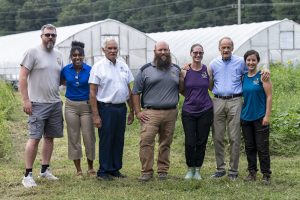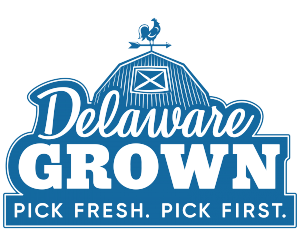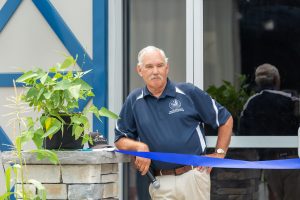
Scuse Has Always Hung His Hat Up In Delaware

By: Stacey Hofmann, Delaware Department of Agriculture, Chief of Community Relations
Unlike Toby Keith’s song, Should’ve Been a Cowboy, Michael T. Scuse truly is Delaware’s cowboy. Growing up on his family farm in Smyrna, his love for the land is in his blood. Combined with his skill in riding Paint horses, sporting cowboy boots and his black cowboy hat, and his values which align with the cowboy code of conduct, Scuse has significantly impacted Delaware agriculture throughout his lifetime. When Governor Minner nominated Scuse to serve as Delaware’s ninth Secretary of Agriculture in 2001, she saw potential when perhaps he only had a “dream in his eye and a prayer in his heart.” But no matter where life has taken him, Secretary of Agriculture Michael T. Scuse has always hung his hat up in his home state of Delaware, fighting to ensure agriculture remains Delaware’s top industry.
When you look back to the old Western movies, the color of the cowboy hat signifies the actor’s role in the story, either the hero or the villain. But in real life, the black cowboy hat held a sense of power, signifying the person wearing it was confident, dominant, and authoritative. Midwestern law enforcement also wore black cowboy hats to demonstrate they were there to protect. Over time, the meaning of the black cowboy hat has also encompassed elegance, strength, individuality, uniqueness, undefeatability, and style. While most of these adjectives describe Scuse, no man is undefeatable, so competitive may be a better term, and it definitely applies to Scuse.
Sitting down recently with Secretary Scuse, he shared there was so much accomplished during the Minner administration to benefit agriculture, that he chose to highlight the following successes:
- Delaware’s Farmland Preservation license plate was designed and made available so that Delawareans purchasing the plate could help preserve farmland.
- He created the Forestland Preservation Program, preserving forested properties in managed timber production. When he left office, though, funding dried up until he returned and could reinstate the program in 2019. Between the Minner and Carney administrations, the program purchased 20 forestland easements on more than 1,650 acres, another 2,200 acres in 10-year forestland areas, and another 40,600 acres of forest preserved under Aglands Preservation.
- Under his leadership, the Delaware Department of Agriculture and the University of Delaware’s College of Agriculture and Natural Resources (CANR) had a strong working relationship.
- In 2004, Secretary Scuse led Delaware and Maryland through low-pathogenicity avian influenza (LPAI), affecting two farms in Delaware and one in Maryland. This was accomplished utilizing a Unified Command between Delaware, Maryland, USDA-APHIS, and key stakeholders, of which Dr. Robin Morgan, Dean of CANR, played a pivotal role. USDA-APHIS utilized Delaware’s response as an example of how to handle future outbreaks.
- Scuse teamed up with Morgan again to create LEADelaware, a two-year leadership program to help develop the next generation of leaders in production, agribusiness, and policy in the food and fiber industries.
- Then he partnered with Ed Kee of the University of Delaware’s Cooperative Extension to create Delaware Ag Week, a one-stop shop for farmers to learn about the latest research, earn continuing education credits, and network with agribusinesses.
- Before he left office to become Minner’s Chief of Staff in the last few months of the administration, Scuse fought hard to get funding in the Farm Bill to support research efforts to improve Delaware’s specialty crop industry. While he would not see the program’s impact during that term, when he returned to serve under Governor John Carney, the Department secured more than $3.2 million from the USDA’s Agricultural Marketing Service to support 72 multi-year projects.

Even with the change of administration in 2009, Scuse was not looking to ride off into the sunset. Scuse accepted a position at USDA as the Under Secretary for Farm and Foreign Agricultural Services. Helping Delaware farmers find new markets for their products had been a key part of his role while serving under Minner. He would eventually become the Acting U.S. Deputy Secretary of Agriculture. Scuse visited 27 countries and 48 states in those eight years, working to advance American agriculture. Taking pride in his work, Scuse fought for what was right, remained curious so that he could continue to learn, sat next to farmers struggling through adversity, and assured them he was there to help. Delaware was never far from his heart, no matter where his travels took him.
When Governor Carney called on Scuse to return as Delaware’s Secretary of Agriculture in 2017, there was no doubt that when he hopped back in the saddle, the man taking the reins this time was a more seasoned cowboy, which would be critical for what lay ahead, including the COVID-19 pandemic and the start of the Highly Pathogenic Avian Influenza (HPAI) outbreak in the U.S.
While the Delaware Department of Agriculture has experienced many successes throughout the Carney administration, Secretary Scuse focused on five main areas: agricultural land preservation, agriculture and the environment, food access for Delawareans, protecting Delaware agriculture, and supporting agriculture markets.

Most recently on Scuse’s mind was the Aglands Preservation celebration with Governor Carney, where they unveiled a new sign for farmers to place at the end of their farm lanes or on the farm to help promote the program to the public. He expressed gratitude to Governor Carney, members of the General Assembly, the counties, farmers, and other stakeholders for helping Delaware become the second most effective program in the country. While Governor Carney helped preserve the highest number of farms, Scuse is recognized for overseeing 40.5% of Delaware’s total farmland preserved and securing 60% of the program funding during both his terms to preserve 687 farms on 63,100 acres. In 2018, Delaware was recognized as the first USDA Natural Resources Conservation Service – Agricultural Conservation Easement Program certified entity, allowing the program to preserve farmland more quickly.
With Delaware in the Chesapeake Bay Watershed, protecting the environment is essential. Through his work, Secretary Scuse secured a significant increase in funding to invest in cover crops to help offset the costs for farmers to plant cover crops, which reduce agricultural nutrient runoff, improve water quality, and mitigate climate change. The Department also secured funding for manure relocation, assistance for farmers needing nutrient management planning, and increased positions within the University of Delaware Extension for agriculture and turf nutrient management. The Delaware Forest Service, based within the Department, also improved the environment by planting over 1 million trees in the past four years, reestablished wildlife habitat through sustainable forestry practices, and, between both administrations, issued 538 grants and over $3 million in funding to communities and municipalities to plant trees.
As producers upgraded to more environmentally friendly poultry houses, Secretary Scuse saw a need to address abandoned poultry houses that had reached the end of their lifespan. In 2023, he developed a cost-share program to help offset the removal costs of 56 abandoned poultry houses, lessen their environmental impact, and enhance Delaware’s rural landscape.

Early in the Carney administration, Scuse, along with Deputy Secretary Nikko Brady, saw a need to create the Delaware Council on Farm and Food Policy to maintain updated knowledge and awareness about food access opportunities and concerns. The Council secured $2 million in ARPA funding to launch the First State Food System Grant Program to improve the capacity, efficiency, and coordination of Delaware food producers and strengthen the state’s food supply chain. They also obtained over $3 million in funding from USDA to help local and underserved producers maintain and improve the resiliency of the state’s food and agricultural supply. By 2020, the Council’s success in promoting nutrition through data analysis and improving healthy food access earned them the Lieutenant Governor’s Challenge Wellness Leadership Award.
Even the most balanced cowboy gets thrown off occasionally, and Delaware agriculture has seen some hardships. Secretary Scuse has worked hard to minimize impacts on Delaware’s producers and agribusinesses using his experience at the state and federal level, along with his contacts here and abroad. While many would like to forget the COVID-19 pandemic, the Department worked day and night to navigate the issues impacting the industry. It brought to light that without agriculture, Delawareans could not eat. For the first time in many years, we saw Delawareans seeking food directly from the source, which was huge.
As soon as we seemed to clear the pandemic, Highly Pathogenic Avian Influenza (HPAI) hit North America with a vengeance. We have never experienced an animal health emergency of this scale in the country’s history. In 2022, Delaware was the fifth state to experience HPAI in a commercial operation and the first state with over 1 million birds impacted. Again, under Scuse’s leadership, the spread of the virus was quickly stopped, with only three commercial operations in Delaware impacted. Secretary Scuse has worked with producers, agribusinesses, government officials, and agricultural advocacy groups to ensure that all sectors had the latest information to help our producers minimize impacts on trade and export during the COVID-19 pandemic, the HPAI outbreak, the Francis Scott Key Bridge disaster, and other interstate commerce challenges.
 Disasters aside, Secretary Scuse shared that protecting agriculture also ensures we have an industry 25, 50, and 100 years from now to feed our families. Access to financing is a barrier to ensuring that young and beginning farmers can succeed. Scuse realized an opportunity to reinvent the DRIP Program, using the funding allocated from the Delaware Economic Development Authority in the Division of Small Business to help farmers and aquaculture producers purchase equipment they need to get started or to expand their operations by developing the Delaware Agricultural Finance Program. Another challenge for agriculture is that more people are moving into the state, and some areas are shifting from rural to suburban communities. In 2024, the Department partnered with a non-profit to launch the Delaware Agricultural Mediation Program with the support of USDA funding to provide low-cost mediation to Delaware farmers with legal conflicts, neighbor disputes, family inheritance concerns, and more. Finally, in 2024, working with the Delaware Farm Bureau, we saw legislation passed and signed into law by Governor Carney to protect agriculture and help producers, including the Delaware Crop Insurance Assistance and Dairy Margin Subsidies.
Disasters aside, Secretary Scuse shared that protecting agriculture also ensures we have an industry 25, 50, and 100 years from now to feed our families. Access to financing is a barrier to ensuring that young and beginning farmers can succeed. Scuse realized an opportunity to reinvent the DRIP Program, using the funding allocated from the Delaware Economic Development Authority in the Division of Small Business to help farmers and aquaculture producers purchase equipment they need to get started or to expand their operations by developing the Delaware Agricultural Finance Program. Another challenge for agriculture is that more people are moving into the state, and some areas are shifting from rural to suburban communities. In 2024, the Department partnered with a non-profit to launch the Delaware Agricultural Mediation Program with the support of USDA funding to provide low-cost mediation to Delaware farmers with legal conflicts, neighbor disputes, family inheritance concerns, and more. Finally, in 2024, working with the Delaware Farm Bureau, we saw legislation passed and signed into law by Governor Carney to protect agriculture and help producers, including the Delaware Crop Insurance Assistance and Dairy Margin Subsidies.
Besides Scuse’s work in trade and the efforts that he and the Department have made to increase funding for specialty crops, Scuse looks forward to seeing the long-term impacts of two major programs within the state to help support agriculture markets. In the early years of the Carney administration, Scuse’s team conducted research involving consumer awareness of Delaware’s specialty crops and brand studies to create the Delaware Grown brand. Delaware producers and retail businesses have asked the Department to help expand the brand to help them gain access to additional markets. The Department has secured the funding to take this project on for their stakeholders; however, they anticipate it will take about three years before witnessing the full impact on the industry. The second major project, USDA’s Resilient Food System Infrastructure Program, aims to strengthen the middle of the supply chain. Delaware has received over $2 million in funding to improve infrastructure and provide the equipment that those working in this space need to succeed. Scuse believes that both of these programs will positively impact the economic development of the state’s agriculture industry.
 So, what’s next? Will Scuse don his black cowboy hat and ride off into the sunset, or is there more work for him? On his way out in January, he plans to tip his hat in salute to those still left behind who will continue to improve Delaware’s agriculture industry and protect consumers at the Department of Agriculture. But he looks forward to enjoying time traveling with his wife, visiting friends he made over the past 24 years serving agriculture, spending time with his family, and heading into the field to do some hunting. Undoubtedly, he will still keep tabs on the agriculture industry and will celebrate the best 10 days of the summer at the Delaware State Fair.
So, what’s next? Will Scuse don his black cowboy hat and ride off into the sunset, or is there more work for him? On his way out in January, he plans to tip his hat in salute to those still left behind who will continue to improve Delaware’s agriculture industry and protect consumers at the Department of Agriculture. But he looks forward to enjoying time traveling with his wife, visiting friends he made over the past 24 years serving agriculture, spending time with his family, and heading into the field to do some hunting. Undoubtedly, he will still keep tabs on the agriculture industry and will celebrate the best 10 days of the summer at the Delaware State Fair.
###
See this document for more on the accomplishments of the Delaware Department of Agriculture under the leadership of Secretary of Agriculture Michael T. Scuse during both the Minner and Carney Administrations.
Distribution channels:
Legal Disclaimer:
EIN Presswire provides this news content "as is" without warranty of any kind. We do not accept any responsibility or liability for the accuracy, content, images, videos, licenses, completeness, legality, or reliability of the information contained in this article. If you have any complaints or copyright issues related to this article, kindly contact the author above.
Submit your press release